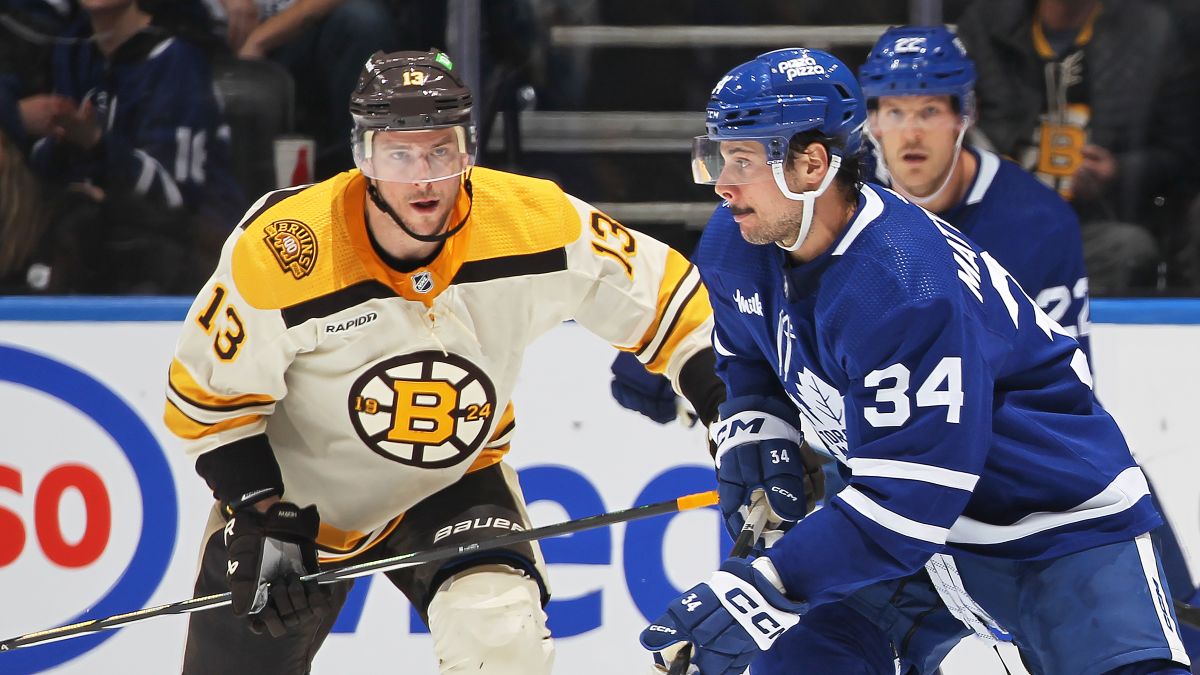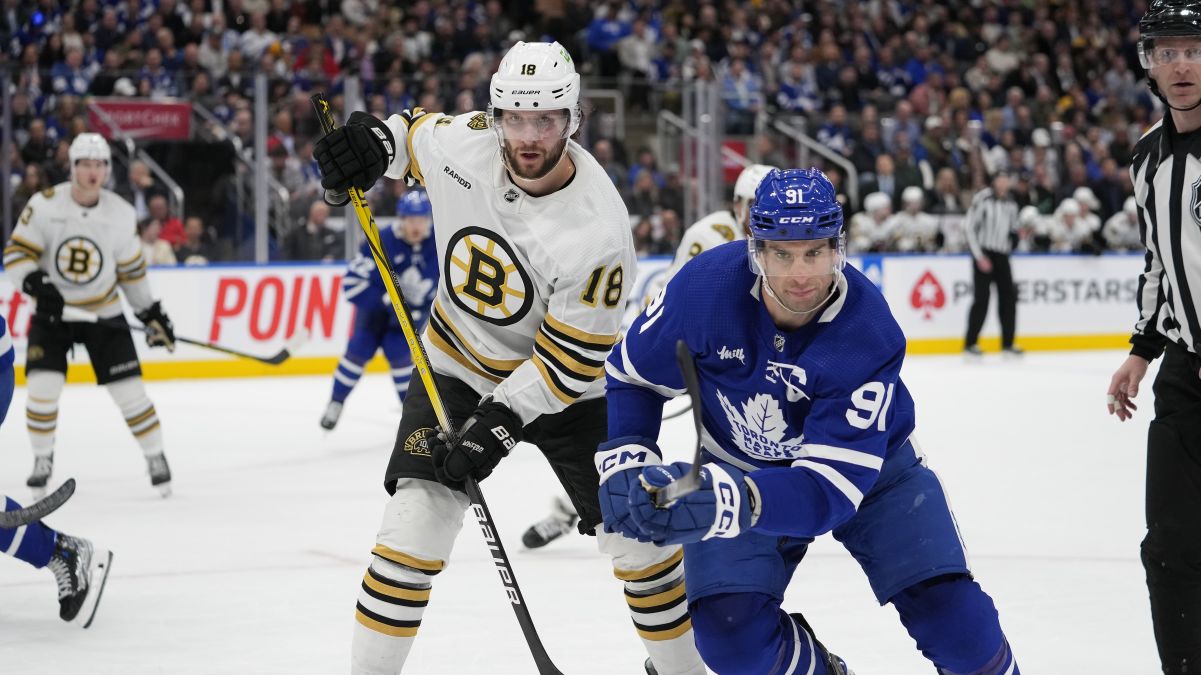NHL teams have opened their wallets and let cash fly in the beginning of free agency.
More than $900 million worth of contracts has been signed/agreed to since the market officially opened last Wednesday.
Unlike the NBA, championships are rarely won in NHL free agency, but this is a great time for teams to add much-needed depth to their roster.
Stay in the game with the latest updates on your beloved Boston sports teams! Sign up here for our All Access Daily newsletter.
Here's a list of notable winners and losers from free agency so far. All salary information is from CapFriendly.
WINNERS: Young defensemen
It's a great time to be a top-tier young defenseman. Despite the flat cap likely being a reality for the next couple seasons, teams have been more than willing to splurge on the cornerstones of their blue line.
Here's a list of young defensemen who got PAID over the last week or so:
- Zach Werenski, CBJ: Six years, $57.5 million ($9.85M cap hit)
- Cale Makar, COL: Six years, $54 million ($9M cap hit)
- Miro Heiskanen, DAL: Eight years, $67.6 million ($8.45M cap hit)
- Dougie Hamilton, NJD: Seven years, $63 million ($9M cap hit)
- Seth Jones, CHI: Eight years, $76 million ($9.5M cap hit)
These players are really hard to find, so when you acquire one, it's almost always a sound investment to invest long term.
Boston Bruins
One player who must love these contracts is Bruins star Charlie McAvoy, who's a top-five defenseman in the league and entering the final year of his current deal.
LOSERS: Edmonton Oilers
This one was predictable, right?
After acquiring a 38-year-old Duncan Keith, the Oilers let a younger and better player in Adam Larsson walk in free agency, further weakening the blue line. They also brought back Tyson Barrie, who puts up consistently good scoring totals but isn't a shutdown defenseman by any means. Cody Ceci was a strange move by the Oilers as well. The 27-year-old defenseman has never reached the 30-point mark in a single season and at best is an average third-pairing defenseman. That's not the player you sign to a four-year deal worth $3.25 million per season.
The Zach Hyman contract is another one that could hurt the Oilers in the not-so-distant future. Giving him seven years and $38.5 million, including a full no-movement clause for the first five years, was a bad move. Hyman is a solid middle-six winger, but his career high in goals is just 21. That cap space could've been spent on a more pressing need, such as a top-four defenseman.
The Oilers need to win now with Connor McDavid and Leon Draisaitl performing at an MVP level. This summer was a great opportunity to surround those two superstars with better talent and depth with more than $20 million in cap space available. Instead, the Oilers spent that cap space by overpaying for overrated or below average players.
Edmonton is now worse than it was last season.
Yikes.
WINNERS: New Jersey Devils
The Devils needed an elite defenseman and they acquired the best one available in free agency.
Dougie Hamilton signed a seven-year contract worth $9.5 million per season, one that adds plenty of value for New Jersey. Hamilton drives puck possession and scoring at a high rate. He's also an excellent skater and has improved defensively since breaking into the league with Boston in 2013.
The Devils also bolstered their goaltending talent and depth by signing Jonathan Bernier to a two-year, $8.25 million deal. Bernier adds plenty of experience and gives starter MacKenzie Blackwood a reliable backup. Bernier posted good numbers last season, including a .914 save percentage, despite playing behind a bad Red Wings team that finished with the fifth-worst record in the league.
LOSERS: Boston Bruins
The Bruins added plenty of depth up front and on the blue line in free agency with the signings of forwards Nick Foligno, Tomas Nosek, Erik Haula and defensemen Derek Forbort. Boston also re-signed two of its own free agents, left winger Taylor Hall and defenseman Mike Reilly to team-friendly deals.
The Bruins' best signing was goaltender Linus Ullmark. The 27-year-old Swede posted really impressive numbers last season despite playing on a historically bad Sabres team. His four-year, $20 million contract was a good deal for the Bruins cap-wise.
So, why are the Bruins losers?
Their No. 1 need -- a left-shooting top-four defenseman -- still hasn't been addressed. Furthermore, David Krejci choosing to leave the Bruins and return home to the Czech Republic leaves a massive hole at second-line center. The Bruins don't have any good internal options to fill Krejci's shoes. Charlie Coyle is best suited as a third-line center. Foligno is more of a winger and not a top-six player at this stage of his career. Jack Studnicka likely is not ready for a No. 2 center job after a disappointing 2020-21 campaign.
Krug, Bergeron react to David Krejci leaving Bruins
Complicating matters for the Bruins is there aren't any top-six centers or top-four defensemen remaining on the free agent market. A trade is Boston's best bet at this point, but these signings have left the team with just over $1 million cap space, thus limiting the team's financial flexibility.
Right now, the Bruins' roster is slightly worse or largely the same in terms of quality as it was last season. That's not going to be good enough to win the Stanley Cup.
WINNERS: Seattle Kraken
The Kraken didn't have an exceptional expansion draft, but their free agent signings were pretty solid.
They found a No. 1 goalie in Philipp Grubauer, who was a Vezina Trophy finalist last season after posting a 1.95 GAA and a .922 save percentage for the Avalanche. Seattle also signed a quality backup in RFA Chris Driedger to a three-year, $10.5 million deal.
The Kraken bolstered their scoring depth by signing forwards Jaden Schwartz and Alexander Wennberg, while also fortifying the blue line with the additions of Jamie Oleksiak and Adam Larson. Seattle overpaid a bit for Oleksiak, but he'll bring some much-needed toughness and size to its lineup.
Overall. it was a very good couple of days in free agency for the league's newest team. And even after all of these moves, the Kraken have done well to leave themselves $16.4 million in salary cap space, which will help them immensely at the trade deadline next season if they're a buyer.
LOSERS: Carolina Hurricanes
The Hurricanes ranked third in save percentage and fourth in goals allowed last season with Alex Nedeljkovic, James Reimer and Petr Mrazek in net. Despite those excellent numbers, the Hurricanes completely overhauled their goaltending by letting go of all three players.
Trading Nedeljkovic to the Red Wings, who immediately signed him to a team-friendly contract (two years, $6 million) as an RFA, made no sense for the Hurricanes. Nedeljkovic looked like a true No. 1 goalie and bringing him back wouldn't have been costly at all.
Instead, the Hurricanes brought in an injury prone Frederik Andersen, veteran Antti Raanta and Alex Lyon as their NHL goalies. That's a genuine downgrade from the previous season.
Furthermore, the Hurricanes had the salary cap space to re-sign Dougie Hamilton and chose not to bring him back. The Hurricanes still have a quality blue line, but replacing a top offensive defenseman is no easy task.
WINNERS: Goalies
It's been a nice offseason for goalies.
Here's a recap of the most notable contracts:
- Chris Driedger, SEA: Three years, $10.5 million ($3.5M cap hit)
- Petr Mrazek, TOR: Three years, $11.4 million ($3.8M cap hit)
- Jonathan Bernier, NJD: Two years, $8.25 million ($4.125M cap hit)
- Philipp Grubauer, SEA: Six years, $35.4 million ($5.9M cap hit)
- Linus Ullmark, BOS: Four years, $20 million ($5M cap hit)
LOSERS: Calgary Flames
Calgary's marquee move in free agency was signing forward Blake Coleman to a six-year, $29.4 million contract. Coleman is a solid player who helped the Lightning win the last two Stanley Cup titles. But that's a lot of term and cap space to give a player of his caliber, especially for a team that's not a real Cup contender.
The Flames also have done nothing to improve their blue line in a meaningful way, which took a hit when captain and top-four defenseman Mark Giordano was lost in the Seattle expansion draft.
The Flames needed to shake up their core and re-tool/rebuild or make substantial upgrades to compete next season. They've done neither so far, and as a result it's tough to envision this team making the playoffs next season.


